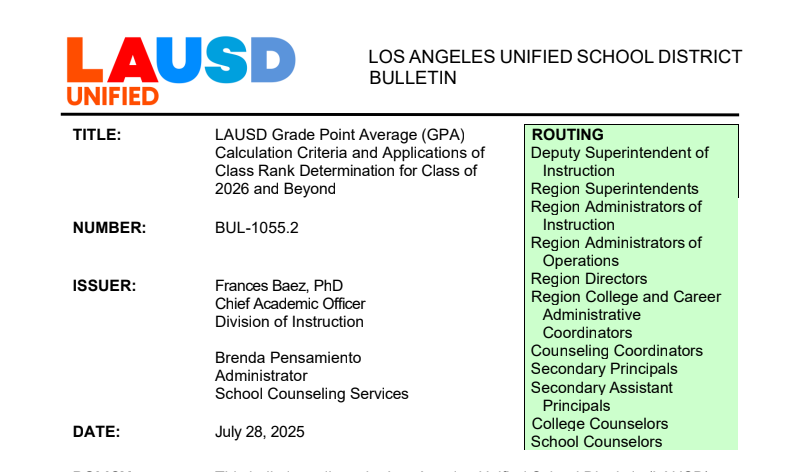
The Los Angeles Unified School District’s new grading policy of augmenting some previously unaugmented classes should not be capable of affecting non-incoming, graduating, students of the class of 2026, 2027, and 2028.
The LAUSD bulletin was only recently published earlier this month, which is already several months past the original publishing deadline that was supposedly announced to be distributed in early May. Yet, this is affecting future classes. These are classes of students that have not had access to what these changes would be entailing.
Angelina Huang, a junior at Kennedy stated, “The information was given to us late and left me unknowing what classes I should take in addition to my high school classes.”
Some of the changes entail differences in what honors classes can and will be counted towards augmentation, how much of a grade boost is given to those honors and advanced placement classes, and the addition of college course augmentation for specific classes. For example, honors level United States history, which was previously not augmented, is now augmented.
This change leaves disgruntled students who chose to do more work and take advanced placement classes in exchange for an honors class when now students that chose to do less work are getting augmentation as well? The recently published bulletin stated that they changed the level of augmentation for students in order to recognize AP, IB, and honors level students. However, the honors courses that were labeled to be rigorous were able to get augmentation before these changes as well. while the classes that were less reputable for being difficult classes did not.
Lorin Abarr, college counselor at Kennedy, stated, “The new GPA augmentation system may incentivize some students to take more community college courses to achieve a higher GPA, but students should keep in mind that selective colleges also place a significant value on extracurricular involvement.”
Students may fall under the stress of feeling as though they need to take a bunch of college courses to make up for the time that they spent in school, not knowing that this change was occurring. It was only barely the spring semester of 2025 when counselors made rounds into homerooms to tell students that there was a change that would be affecting students from over a year ago to now.
It is not fair that these rules, which failed to be published well before the affected year, are capable of affecting non-incoming students. Students had to go out of their own way to ask counselors for details, details that the counselors did not have. Why? This is due to the fact that even the counselors, themselves, did not have access to these changes and what these changes would be entailing.
How can these rules published in the fall semester of 2025 be affecting seniors that are graduating the following semester, spring semester of 2026? It makes sense for the new rules to be affecting incoming freshmen, fall of 2025 because the bulletin was published during the same timeframe that their high school careers are starting.
But for those students who have already been participating students of Kennedy for at least one year, it is presenting an unfair advantage in the favor of students who took courses unknowingly in the circumstance that a student was not aware that taking college courses would benefit them.